Film Review: There Is No Evil (2021)



There Is No Evil is bitterly fascinating on every level possible. Its director, iconoclast and provocateur Mohammad Rasoulof, has been arrested by Iranian authorities on several occasions over the content of his films, and has even served prison time because of it. He has been accused of “propaganda against the system,” and has been prohibited from leaving the country. To make There Is No Evil, Rasoulof had to shoot in total secrecy, then smuggle the finished product out of Iran to be seen internationally, where it won top prizes at both the Berlin International Film Festival and the Sydney Film Festival. Rasoulof could not attend either due to his incarceration in Iran. Screenings of There Is No Evil are banned in the filmmaker’s native country.

Despite the hardships, pressure, and mounting legal woes, what Rasoulof has crafted is nothing short of extraordinary. From its opening moments, There Is No Evil – an Iranian anthology film about that country’s brutal death penalty procedures and the men who carry them out – grabbed me and never let go. This is storytelling at its finest, made even more compelling by the circumstances of its production, the bravery of its director, and the system that would suppress it.

Told through four loosely-knit stories, There Is No Evil is a sometimes shocking, always eye-opening look at the Iranian state’s attitudes towards criminal justice, and those forced to carry out its harsh sentences. As can be inferred from Rasoulof’s own legal troubles, this repressive system is an unforgiving beast that doesn’t stop with overt criminality, but extends towards whatever may be deemed as cultural and political crimes as well.

Taking a different approach than most movies covering similar thematic ground, Rasoulof chooses to focus on the men whose hands are on the lever rather than the lives or crimes of the condemned. From this viewpoint, he’s able to weave a narrative that pinpoints the corrupting power state control has over the individual by detailing the fear, revulsion, normalization, and eventual indifference felt by those of little power who are given an intense amount of it for split-second periods of time. This captivating character study ponders the extremely heavy ethical questions of service, duty, resistance, and forgiveness in a way that is both powerful and terrifying, and does so with more beauty and understanding than anything I’ve ever seen on the subject. It is an absolutely fantastic film.
